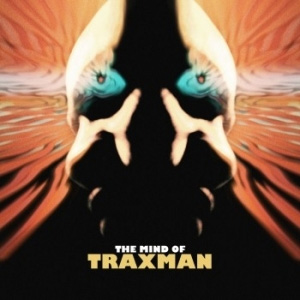Sumptuous, grand, straight up soulful? This is footwork, Jim, but not as we know it. By opening his debut full-length with ‘Footworkin On Air”s elegant kalimba melody – something you’d sooner associate with 4th world-plundering art-rock – Cornelius Ferguson sets his stall out early. The Mind Of Traxman upscales the footwork universe, in a bid to render the genre an enduring art-form for the masses keeping ears tuned via Planet Mu’s recent release schedule.
Of course, there’s no ‘content’ here to make that crusade explicit, no rapping, social commentary, thematic song titles – nothing like that. Just a dramatically expanded vocabulary, a romantic sheen (jaw-dropping, considering the utilitarian nature of most footwork), and a subtle but distinct suggestion that a ‘statement’ is being made. “I want this to be a historical footwork album,” Ferguson told The Stool Pigeon, “to educate and bring everybody together, and let people know that this music is going to be around forever.” If it’s not quite the genre’s first ‘proper’ album, Ferguson’s tracks nonetheless furnish its signifiers with an extra dimension; be it emotion, meaning, or maturity. By the time you reach synth-euphoric, Prince-sampling closer, ‘Lifeeeee Is For Ever’ (conceivably footwork’s first tear-jerker), you feel as though you’ve been on some kind of a journey, a distinct narrative arc. Its lasting effect might even be to debunk the genre’s image as solely a dance genre (just as hip-hop was once viewed).
It’s as if Ferguson’s intentions are to elevate footwork to above street level and blast it into space. The edgier ghetto house feel has been shifted and suppressed slightly through forgiving textures (warm orchestral instruments, tactile synths) and samples. Booty-bass profanity is replaced with tribal/spiritual reverie (‘Going Wild’) and jazz samples, as well as a Dilla-esque predominance of soul cuts and dialogue-clips of dignified blues singers (Think Moby, but not horrible). Even the rock-heavy ‘Let There Be Rock’ seems exalted, rather than how you’d expect a rock-informed footwork track would sound – all grot and street-wise aggression.
It’s something of an overhaul of the brittle avant-trash aesthetic that’s characterised footwork up to now. What with YouTube being the genre’s primary distribution method, seeding an ever swelling flood of output, a great deal of footwork has seemed somehow digi-disposable. Conversely, The Mind Of Traxman is an attempt to make a footwork album that sounds rare, cherish-able. And, it must be said, more palatable. Which is not to be confused with ‘tasteful’ – as a set it’s frequently stank-nasty, to borrow from the youth lexicon. At any rate, a decent soundsystem or pair of headphones swiftly puts paid to accusations of politeness.
One aspect of Traxman’s personality that fully informs the album is Ferguson’s self-confessed status as a jazz fiend. ‘Itz Crack’, with its combination of clarinet, double-bass and keening synthline, recalls the high-class garage of MJ Cole, while the aptly-named ‘Chill’ uses elegiac jazz piano and stately woodwind for something sensuously euphonic. It’s a focus on texture that’s again apparent on second kalimba track ‘Sound Filed’, with its almost submerged mix, cut into exquisitely by white-hot key-chains. It packs real atmosphere, and is great headphone music.
Further drawing on lofty touchstones, ‘Lady Dro’ absorbs the Afro-conscious funk of the mid 70s, its bongos interlaced with a sample from Jackson 5’s production team, The Mizell Brothers. ‘Conq Dat Bitch’, meanwhile, sounds almost French nouveau-vague: Air chronicling Chicago’s streets. Then there’s a wealth of majestic soul samples, with ‘I Need Money’ employing Philly-soul strings and ‘Rock You”s bubbling toms no match for the dreamy soul melismas over foot. In fact, the latter could well be footwork’s hitherto most tranquil two minutes. And throughout, The Mind Of Traxman pays dewy-eyed tribute to footwork’s club roots. ‘Work Me 2011’ fuses the spirituality of deep house with ghettotech’s sharp swirls, while ‘1988’ gets acid house in a cosily nostalgic manner.
Now for the catch. It’s not that, by getting panoramic, Ferguson has compromised the genre’s utilitarian raison d’etre. It remains a radical, often caustically weird dance form. But some aspects of footwork, quite intrinsic ones, aren’t so apparent here. Widely credited with being one of the sound’s originators, to this day RP Boo presides over an entire other tract of footwork: a dark and disturbed branch of the genre which often captures the style at its most exhilarating. Ferguson’s music here frequently feels divorced from that climate of intensity and hideousness. Bangin’ though it be, the Arabic-sung ‘Going Wild’ feels far too respectable for it’s own good.
The Mind Of Traxman, rarely overly solemn and ever-playful, is still far from a middlebrow defanging. However, in its naturalistic presentation Ferguson here has pumped warmth into a genre that often runs ice-cold on a sort of cybernetic vacancy. In doing so, the album frequently feels detached from footwork’s starker and more avant garde corners. But when all’s said and done, it matters little in the end. Because every time those byzantine drum patterns roll into life, you’ve got all the avant garde you’ll ever need.


